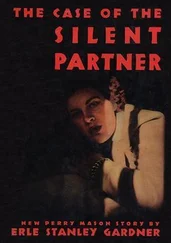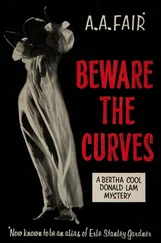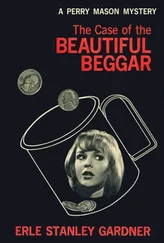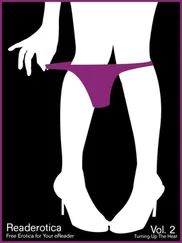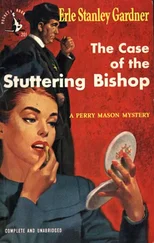“I contacted this Evaline Harris. I have her address here in case you’re interested. I put it up to her that I was an adjuster from the railroad company. Her trunk was damaged in transit to Oakview. She fell for it. I told her we had to know her business and why she was going under an assumed name. She said she was making an investigation trying to find out about a woman and that she was making that investigation on behalf of the woman’s husband. Now then, why didn’t you play fair with us?”
There was surprise on his face. “The woman’s husband?” he repeated.
I nodded.
“Then she’s married,” he said.
“To you.”
“No, no, there must be someone else.”
“There wasn’t. Mrs. Lintig showed up in Oakview, hired an attorney, and secured a dismissal of the divorce action on the grounds of lack of prosecution. I talked with her—”
“You talked with her?” he interrupted.
I nodded.
“What does she look like?” he asked. “How is she?”
“She shows her age,” I said. “I’m assuming she was approximately your age.”
“Three years older.”
“All right. She looks it, every bit of it. She’s put on some weight. Her hair is silver-grey. She’s a fairly competent-looking customer.”
He clamped his lips together. “Where is she now?”
“I don’t know. She left Oakview.”
His eyes became hard. “Why didn’t you follow her?”
I sprang my alibi on him. “Because Bertha Cool had telephoned me and said that we were fired.”
“Good heavens, that’s the one thing I wanted. I want to know where she is. I want to know about her. I want to know what she’s doing, what she’s been doing, whether she’s married. I want to find out all about her. And you let her slip through your fingers!”
“Because we were fired,” I pointed out, patiently. “I thought you acted hastily under the circumstances. I decided to run down to Santa Carlotta and tell you the facts.”
He pushed back his chair and paced the office nervously. Abruptly he turned and said, “I simply have to find her.”
“Our agency is the best means you have of doing that.”
“Yes, yes. I want you to find her. Go ahead and get busy. Don’t waste any time. Don’t waste a moment.”
I said, “All right. Doctor. The next time we get on a hot trail, don’t call us off. After all, you have only yourself to thank for this. If you’d trusted us and been frank with us, we could have closed the case within forty-eight hours without any further expense. As it is, we’ve got to begin all over again.”
“Look here,” he said. “Can I trust you?”
“I don’t know why not.”
“You won’t try to take advantage of me?”
I shrugged my shoulders and said, “The fact that I’m here, and not asking for a shakedown, is your best evidence of that.”
“Yes,” he said, “it is. I’m sorry. I apologize. I apologize to you. Explain the circumstances to Mrs. Cool, will you?”
“Yes, and you want us to go right back to work?”
“Right back to work,” he said. “Wait a minute. I want the address of that young woman who claimed I’d employed her. It’s preposterous. I never heard of such a thing.”
I gave him Evaline Harris’s address.
“Get started right away,” he said.
I said, “All right. Shall we make reports here, Doctor?”
“No, no. Make those reports just as I instructed Mrs. Cool. Make them to Mr. Smith at the address I gave her. Don’t under any circumstances let anyone know where I am or who I am. It would be — disastrous.”
“I think I understand.”
“Get out of town at once. Don’t form any acquaintances here. Don’t be seen around my office.”
I said, “All right. We’ll protect you at our end of the line, but be careful with those reports we’re sending.”
“That’s all arranged for,” he said.
“And you don’t know anything about this Evaline Harris?”
“Good heavens, no!”
“Well,” I told him, “it’s going to be a job. We’re working on a cold trail again.”
I understand. It’s my fault, but that’s something I’ve worried about for years, that someone might try to trace me through my professional registration. You were clever — damned clever — too damned clever.”
“One other thing,” I said. “Who would be interested in giving me a black eve because of the work I’m doing?”
“What do you mean?”
“A man about six feet,” I said, “something over two hundred pounds, beefy, but not fat, dark hair, deep-set, grey eyes, a man in the late thirties or early forties, a mole on his cheek, and a fist like a pile driver.”
Dr. Alftmont shook his head and said, “I know no one of that description.” But he avoided my eyes as he said it.
“He waited for me in my room in the hotel,” I said. “He knew all about me. He’d appropriated the agency car, driven it around to the back of the hotel.”
“What did he want?”
“He wanted me to leave town.”
“What did you do?”
“Made the mistake of trying to yell for the cops.”
“What happened?”
“When I regained consciousness, I’d been bundled out of town.”
The corners of his lips quivered. His chin moved twice before he said anything. “There m-m-must have been some mistake,” he said.
“There was,” I said dryly. “I made it.”
“You mustn’t let anyone know about what you’re doing or whom you’re working for,” he cautioned. “That’s imperative.”
“Okay,” I said. “I just wanted to know.”
His eyes were fighting fear as I went out. The office nurse looked at me curiously. My money said ten to one she wasn’t Vivian Carter and had never been named as a co-respondent in any divorce action.
My breakfast was long overdue. Santa Carlotta was a city on the through coast highway. It catered to the wealthy tourist trade. There were three swank hotels, half a dozen commercial hotels, and flocks of tourist camps. The restaurants were good. I picked one at random.
I saw a placard in the window. Dr. Alftmont’s features, looking ten years younger, stared out at the street from that placard. I stood at the window and read the printing on the placard:
ELECT Dr. Charles L. Alftmont for MAYOR. Clean up Santa Carlotta. Give crooks a one-way ticket. — Santa Carlotta Municipal Decency League.
I walked in, found a booth, and settled back to the luxury of real orange juice, grapefruit, poached eggs that were fresh and hot on whole-wheat toast that hadn’t been made soggy by having lukewarm water poured over it.
Over coffee and a cigarette, the waitress asked me if I wanted to see the papers. I nodded and, after a moment, she came back rather apologetically and said, “I haven’t a city newspaper available. They’re all in use, but I can give you the local paper, the Ledger .”
I thanked her and took the paper she handed me.
It was a metropolitan job with wire service, balanced headlines, good make-up, and a fair sprinkling of syndicated features.
I turned to the editorial page and read the editorial with interest:
The manner in which the Courier seeks to besmirch the candidacy of Dr. Charles L. Alftmont is probably the best indication available to the unbiased voter of the fear engendered by the candidacy of this upright man.
It has long been readily apparent to any disinterested observer that the strangle hold which the crooked gamblers and underworld influences have upon Santa Carlotta could not exist without a political background. As yet, we are making no direct accusations, but the intelligent voter will do well to watch the tactics used by the opposition. We predict there will be plenty of mudslinging. There will be many more attempts to besmirch the character of Dr. Alftmont as a candidate. No attempt will be made to meet him on the issues which he has raised. If the city does not need a new police commissioner and a new chief of police, the present administration should be willing to discuss vice conditions fairly and impartially. In place of doing that, our mud-slinging contemporary contents itself with veiled innuendoes. We predict that unless a prompt retraction of last night’s editorial is printed, the Courier will find itself involved in a libel suit. And it may be well for the Courier to remember that while political advertising is the sop handed to subservient editors, damages in a libel action are recovered against and payable by the defendant publication.
Читать дальше

